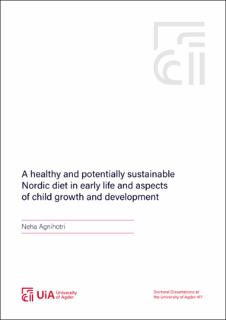| dc.contributor.advisor | Øverby, Nina Cecilie | |
| dc.contributor.advisor | Hillesund, Elisabet Rudjord | |
| dc.contributor.advisor | Bere, Elling | |
| dc.contributor.author | Agnihotri, Neha | |
| dc.date.accessioned | 2023-08-03T13:53:15Z | |
| dc.date.available | 2023-08-03T13:53:15Z | |
| dc.date.created | 2023-07-31T14:25:05Z | |
| dc.date.issued | 2023 | |
| dc.identifier.citation | Agnihotri, N. (2023). A healthy and potentially sustainable Nordic diet in early life and aspects of child growth and development [Doctoral dissertation]. University of Agder. | en_US |
| dc.identifier.isbn | 978-82-8427-132-3 | |
| dc.identifier.issn | 1504-9272 | |
| dc.identifier.uri | https://hdl.handle.net/11250/3082511 | |
| dc.description.abstract | Healthy diets optimize our developmental potential starting from life in womb and can promote longevity, well-being and healthy lives. On the other hand, diets of poor quality were attributable to one in five deaths globally in 2017, mainly caused by cardiovascular disease followed by cancer and diabetes. Moreover, 39 million children under the age of five were overweight or obese in 2020, being at increased future risk of non-communicable diseases. Not only are unhealthy diets detrimental to public health, but more so, they negatively impact the global environment. What we eat directly impacts public health, food systems, environment, economy and the future. However, all healthy foods do not directly translate to being environmentally sustainable. Besides, our dietary habits tend to be influenced by culture, palatability, availability and affordability. Sustainable diets are defined as being health-enhancing with a low environmental impact, while also being culturally appropriate and economically viable. The New Nordic Diet (NND) has been proposed as a regionally appropriate and sustainable diet to the Nordic countries. Consequently, the potential health benefits of the NND have been increasingly investigated in different samples and populations, but there is as yet limited knowledge on the effects of adherence to the NND from fetal life through maternal diet and into childhood. The first 1000 days of life represent a vulnerable phase from the time of conception to child age two years. Healthy child growth and development resulting from a nutritionally adequate maternal and child diet during this phase and beyond, has the potential to impact both present and future health.
In the current thesis, we wanted to investigate whether a dietary pattern in line with the NND could be beneficial for aspects of growth and development in children, while also being healthy and potentially sustainable. Three research aims were put forth to investigate this overarching purpose, which also correspond to the three research papers included in this thesis. First, we aimed to develop child diet scores reflecting adherence to the NND, based on a maternal pregnancy NND-score comprising of ten subscales, which was developed in an earlier related project. The subscales of the score intended to capture foods with a Nordic identity that are locally available, traditionally consumed or have an importance as a food source in the Nordic countries, and that have a healthier potential compared to similar foods in the same food group. Second, we aimed to assess potential associations with the NND-scores and weight status at eight years of age. Third, we wanted to investigate potential associations with the NND-scores and measures of child development up to five years of age. | en_US |
| dc.language.iso | eng | en_US |
| dc.publisher | University of Agder | en_US |
| dc.relation.ispartofseries | Doctoral dissertations at University of Agder; no. 417 | |
| dc.relation.haspart | Paper I: Agnihotri, N., Hillesund, E. R., Bere, E.T., Wills, A. K., Brantsæter, A. L. & Øverby, N. C. (2021). Development and description of New Nordic Diet scores across infancy and childhood in the Norwegian Mother, Father and Child Cohort Study (MoBa). Maternal & Child Nutrition, 17(3): e13150. https://doi.org/10.1111/mcn.13150. Published version. Full-text is available in AURA as a separate file: https://hdl.handle.net/11250/2758450. | en_US |
| dc.relation.haspart | Paper II: Agnihotri, N., Øverby, N. C., Bere, E. T., Wills, A. K., Brantsæter, A. L. & Hillesund, E. R. (2020). Childhood adherence to a potentially healthy and sustainable Nordic diet and later overweight: The Norwegian Mother, Father and Child Cohort Study (MoBa). Maternal & Child Nutrition, 17(2): e13101. https://doi.org/10.1111/mcn.13101. Published version. Full-text is available in AURA as a separate file: https://hdl.handle.net/11250/2711488. | en_US |
| dc.relation.haspart | Paper III: Vejrup, K., Agnihotri, N., Bere, E., Schjølberg, S., LeBlanc, M., Hillesund, E. R., & Øverby, N. C. (2022). Adherence to a healthy and potentially sustainable Nordic diet is associated with child development in The Norwegian Mother, Father and Child Cohort Study (MoBa). Nutrition Journal, 21: 46. https://doi.org/10.1186/s12937-022-00799-5. Published version. Full-text is available in AURA as a separate file: https://hdl.handle.net/11250/3018020. | en_US |
| dc.rights | Attribution-NonCommercial-NoDerivatives 4.0 Internasjonal | * |
| dc.rights.uri | http://creativecommons.org/licenses/by-nc-nd/4.0/deed.no | * |
| dc.title | A healthy and potentially sustainable Nordic diet in early life and aspects of child growth and development | en_US |
| dc.type | Doctoral thesis | en_US |
| dc.description.version | publishedVersion | en_US |
| dc.rights.holder | © 2023 Neha Agnihotri | en_US |
| dc.subject.nsi | VDP::Medisinske Fag: 700::Helsefag: 800::Ernæring: 811 | en_US |
| dc.source.pagenumber | 330 | en_US |
| dc.source.issue | 417 | en_US |
| dc.identifier.cristin | 2164092 | |




